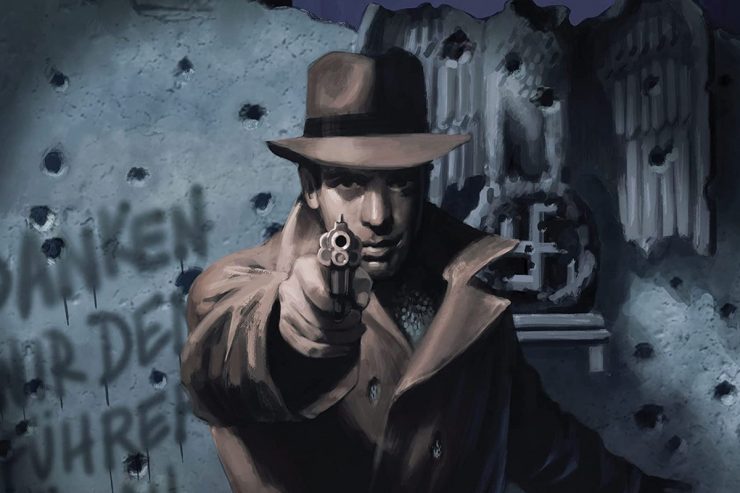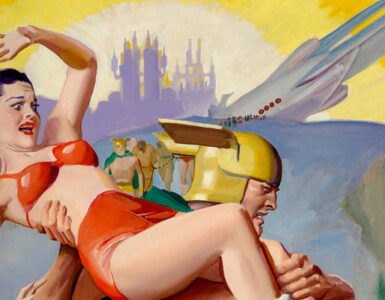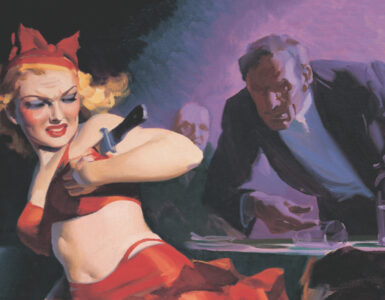Pulp magazines have influenced writers, artists, film directors, software developers, and countless others over the years. Our “PulpFest Profiles” focus on contemporary creators who have drawn inspiration from these rough-paper fiction magazines.
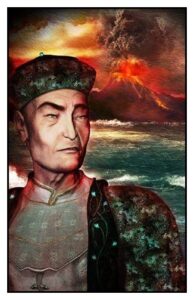 Sara Light-Waller (SLW): Bill, it’s great to chat with you outside of our yearly PulpFest visit. I’ve wanted to find out more about you for some time. Now’s my chance! Let’s start with some basics. When did you start writing professionally?
Sara Light-Waller (SLW): Bill, it’s great to chat with you outside of our yearly PulpFest visit. I’ve wanted to find out more about you for some time. Now’s my chance! Let’s start with some basics. When did you start writing professionally?
William Patrick Maynard (WPM): My first sale came with The Terror of Fu Manchu in 2008 but I’ve never made a living writing. Of course, very few writers can.
SLW: When did you first know you wanted to be a writer?
WPM: Since I was very young. Comic books and newspaper strips have been a part of my world since I was five or six years old. Paperbacks followed quickly thereafter. I was a bookish, often solitary kid and escape meant everything to me. I identified with writers and wanted to tell stories. I always sought out the writer’s name when watching TV or movies. Writers mattered to me because they could tell stories that transported you away from reality. My world was sad and gray. Life was boring. Kids and sometimes adults were cruel. Stories were magic. It’s that simple.
SLW: When and how were you introduced to the pulps?
WPM: Probably through George Lucas. I turned six shortly after Star Wars was first released. All the publicity material I read referenced Lucas as being influenced by pulps and serials. I grew up during the 1970s, the perfect era for paperback reprints. Bookstores, new and used, were plentiful. Drug stores, dime stores, department stores, and even grocery stores had spinner racks with paperbacks. You could easily find titles by Edgar Rice Burroughs and Robert E. Howard. The cover art was at least half the appeal. it was the era of Frank Frazetta, Boris Vallejo, and Neal Adams. It was like uncovering treasures of the past. To me, pulp only referred to the paper they were originally printed on. I didn’t make distinctions between Tarzan, Conan, Flash Gordon, and Buck Rogers. They were all comic books and paperbacks. I still feel the same way.
SLW: Which pulp genres are your favorites?
WPM: I love hardboiled detectives, spy thrillers, lost world and jungle adventures, sword & sorcery, too. I don’t really distinguish between those pulp genres and the Golden Age of Hollywood or Old Time Radio.
SLW: Who are your favorite pulp authors?
WPM: If we’re strictly speaking pulps, I’d say Hammett, Chandler, Burroughs, and Robert E. Howard. If we broaden it to slicks I would include Sapper, John Buchan, and certainly Sax Rohmer.
SLW: You’ve just mentioned Sax Rohmer. I know that you’re a huge fan of his. So what’s the attraction — his style, characters, stories, or all three?
WPM: It is all three, but style is foremost. Rohmer brought a sense of heightened paranoia that he sustained throughout his stories. Even when his characters fell hopelessly in love at the drop of a hat, there remained a constant sense of danger and dread. His was a self-contained world where a story began with a startled narrator asking, “Who’s there?” In Rohmer’s work, a knock at the door meant an unexpected visitor who would change his characters’ lives forever. His most common theme was an English everyman, enticed by the Near or the Far East, who never looked back.
SLW: You’ve gained the license to continue the adventures of Rohmer’s master villain, Dr. Fu Manchu. There are some who complain about the racial and ethnic stereotyping found in Rohmer’s series. But Fu Manchu is from an earlier era when “Yellow Peril” stories were perfectly okay. Do you think that there’s still a place for Fu Manchu in today’s literary world?
WPM: Anyone continuing Fu Manchu is merely adding a footnote to a body of work that grows more obscure with each passing year. Rohmer was flawed and complex, like most people. I don’t mind discussing his work and views, but I’m not interested in engaging with those who want to decide for others what they should be allowed to read, watch, or listen to. Time is the only censor that matters. Nothing lasts forever.
SLW: You’ve written about other popular characters including Sherlock Homes and Zorro. Can you tell us a bit about that?
WPM: I am a genuine Sherlock Holmes fan, but I only did these things because an editor approached me to contribute. I did them for a number of years and then stopped. Zorro will probably be the last one I do. My Holmes stories are really tales about an original character called Shankar Hardwicke. Hopefully, I will live long enough to see all of them published in their proper form rather than as ersatz Holmes stories.
I don’t really aspire to continue other people’s work outside of Rohmer. The reason I’m invited to contribute by an editor is the very reason hardcore fans of the characters end up criticizing the stories. Editors don’t want everything to be the same. Unfortunately, that’s exactly what many fans want. The end result is something that satisfies very few people. If readers aren’t happy, the author isn’t happy. It’s up to the writer to start saying no to contributing. It’s difficult to say no, of course, because it is an honor to be asked. It’s a vicious circle, really. You do it to help further your writing career and end up feeling you’ve done more harm than good.
SLW: Which are your favorite pulp genres to write in?
WPM: Fiction is a byproduct of all that we read. In that sense, the limited genres I write in are secondary to the themes and content of the story. Much of what I write is cathartic, though personal themes aren’t intended to be evident to most readers.
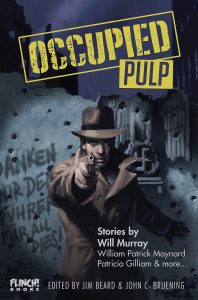 SLW: You’ve mentioned that your story, “The Mitaka Incident” from the anthology Occupied Pulp is one of your favorites. It’s certainly a gem that feels like you’re reading a story written during the pulp era. Please tell us a bit about your inspiration for this story.
SLW: You’ve mentioned that your story, “The Mitaka Incident” from the anthology Occupied Pulp is one of your favorites. It’s certainly a gem that feels like you’re reading a story written during the pulp era. Please tell us a bit about your inspiration for this story.
WPM: That’s the single nicest thing anyone has ever said about it. It is my favorite work by quite a wide margin. I had very high hopes of doing a collection of Code Name: Rainfall stories, but that’s not likely to happen without that story finding a larger audience. The character was one that came out of reading John Buchan and Ian Fleming. I wanted a faceless character who looked like a bank teller but was incredibly dangerous. I didn’t want the reader to learn his name at all. Just get little hints of his backstory without ever unpeeling the onion.
SLW: Occupied Pulp came out in 2021. Please tell us more about the anthology and how it came about.
WPM: I had the character concept for “The Mitaka Incident” and John Bruening and Jim Beard from Flinch! Books approached me with their Graham Greene/Third Man-styled project. It was serendipitous and so I immediately agreed. I still believe in the anthology and certainly in the character.
John and Jim asked for geographic settings in their pitch. I rather liked the idea of taking cold cases from the start of the Cold War and making them the backdrop for each character’s exploits in the East and West. I believe that the one I did was about as close to perfect as I’ll likely get as a writer. If it’s the last thing I ever see published, I’ll be pleased that it was my favorite.
SLW: You’re an accomplished non-fiction writer with hundreds of pop culture articles to your credit. Tell us something about your non-fiction writing career.
WPM: For the most part, my pop culture writings are thanks to Deuce Richardson at The Cimmerian and John O’Neill at Black Gate. Deuce later also asked me to write for the DMR Books blog. Earlier, I had written for a classic horror fanzine and for The Peter Sellers Appreciation Society. All of these led to the opportunity to do Blu-ray commentary tracks. I enjoyed writing anonymously on music or film on various message boards. It’s a disease.
SLW: What are some of your proudest non-fiction accomplishments?
WPM: Pride implies liking something I wrote and that rarely happens. I wrote a piece on Sax Rohmer for the DMR Books blog which I thought came out well. I’ve started a number of series that I intended to finish, but might never get around to doing so. Long pieces on Shang-Chi and Flash Gordon for Black Gate. Time will tell. Much comes down to how long I stay in my current job, how my health holds up, and whether or not we’re allowed to talk about things from the past on a public forum without having it hurt our social credit scores. The thought of living in an increasingly totalitarian society makes me less inclined to want to contribute creatively in any fashion. Mind you, I’ve always been miserable in the world I live in, that’s why escape is so important.
SLW: What’s your dream story, if you had the time and space to write it?
WPM: Code Name: Rainfall, The Triumph of Fu Manchu, The Adventures of Shankar Hardwicke, Lawhead, getting my Dr. Nikola translations across the finish line. Most importantly would be completing several Sax Rohmer projects that I have in various states of completion as an editor. That’s it, really. Give me a decade to concentrate on writing again and I would be ecstatic.
SLW: What’s next for you?
WPM: These days, I’m semi-retired from writing. My real-world job is running Facilities (infrastructure and grounds) for an inner-city hospital campus. It takes more hours than there are in a day and has quite literally taken years off my life because of the demands of working seven days a week and being available for calls 24/7. So long as I’m concentrating on that career and providing for my wife and family, personal pleasures like reading and writing must be put on hold. Nothing lasts forever, not even us.
SLW: Is there anything else that you’d like to mention?
WPM: I’m very grateful for taking part in PulpFest, Windy City, and Pulp Adventurecon. Until I learned of PulpFest, I never knew where I fit. Pulp cons, as well as Monster Bash, immediately felt like home. I’m grateful for the friendships and community. I’m honored that Mike Chomko and Jack Cullers brought me on board to contribute to PulpFest. It has been nothing but a pleasure befriending people whose work I read and respect like Will Murray, Rick Lai, and Win Scott Eckert. There are so many great friendships that came out of the pulp community, some now gone, sadly. Pulp cons meant happy days and I cherish the sense of belonging that the community has afforded. The friendships and laughter are what I remember most fondly.
SLW: Bill, thanks so much for the great conversation! I’ve enjoyed learning more about you and feel sure that our readers will, too.
You can catch up with William Patrick Maynard online at Facebook, LinkedIn, Amazon, and pulpfest.com.
William Patrick Maynard is the licensed continuation author for the Sax Rohmer Literary Estate. His short fiction has been published in anthologies by Airship 27, Bold Venture Press, Black Coat Press, Flinch Books, MX Books, Riviere Blanche, and Titan Books. He has authored over 250 articles for numerous magazines and websites. He has contributed Blu-ray commentary tracks and produced bonus features for releases by MGM, Shout Factory, Kino Lorber, and The Serial Squadron. Bill is on the editorial board of The Battered Silicon Dispatch Box and is a member of the PulpFest Organizing Committee where he serves as Assistant Director of Marketing and Afternoon Programming Director. He resides in Northeast Ohio and regularly contributes to our website.
The illustration of Dr. Fu Manchu that opens our profile is by Christine Clavel created for the not yet published The Triumph of Fu Manchu.
Occupied Pulp, published in 2021 by Flinch! Books and edited by Jim Beard and John C. Bruening, features cover art by Adam Benet Shaw. In addition to William Patrick Maynard’s “The Mitaka Incident,” the anthology features work by Justin Bell, John C. Bruening, Patricia Gilliam, Will Murray, and Bobby Nash.
A professional journalist and illustrator with over thirty years of experience, Sara Light-Waller is an accomplished new-pulp fiction author/illustrator with three books out and more on the way. She is also the winner of the 2020 Cosmos Prize for her illustrated short story, “Battle at Neptune.” A huge pulp fan, Sara is especially fond of science fiction pulps. The extent of her pulp fandom can best be measured by the oversized rendition of Frank R. Paul’s August 1928 Amazing Stories cover that she painted on her garage. Sara is a member of the PulpFest organizing committee and a regular contributor to our website and The Pulpster.
Watch for our next PulpFest Profile in January when William Patrick Maynard will talk with author, editor, and publisher John C. Bruening. John’s latest book, The Midnight Guardian: God and Sinners, is now available. You can purchase the third adventure in the continuing saga of Bruening’s two-fisted hero through Amazon.com or via John’s author page by clicking here.

